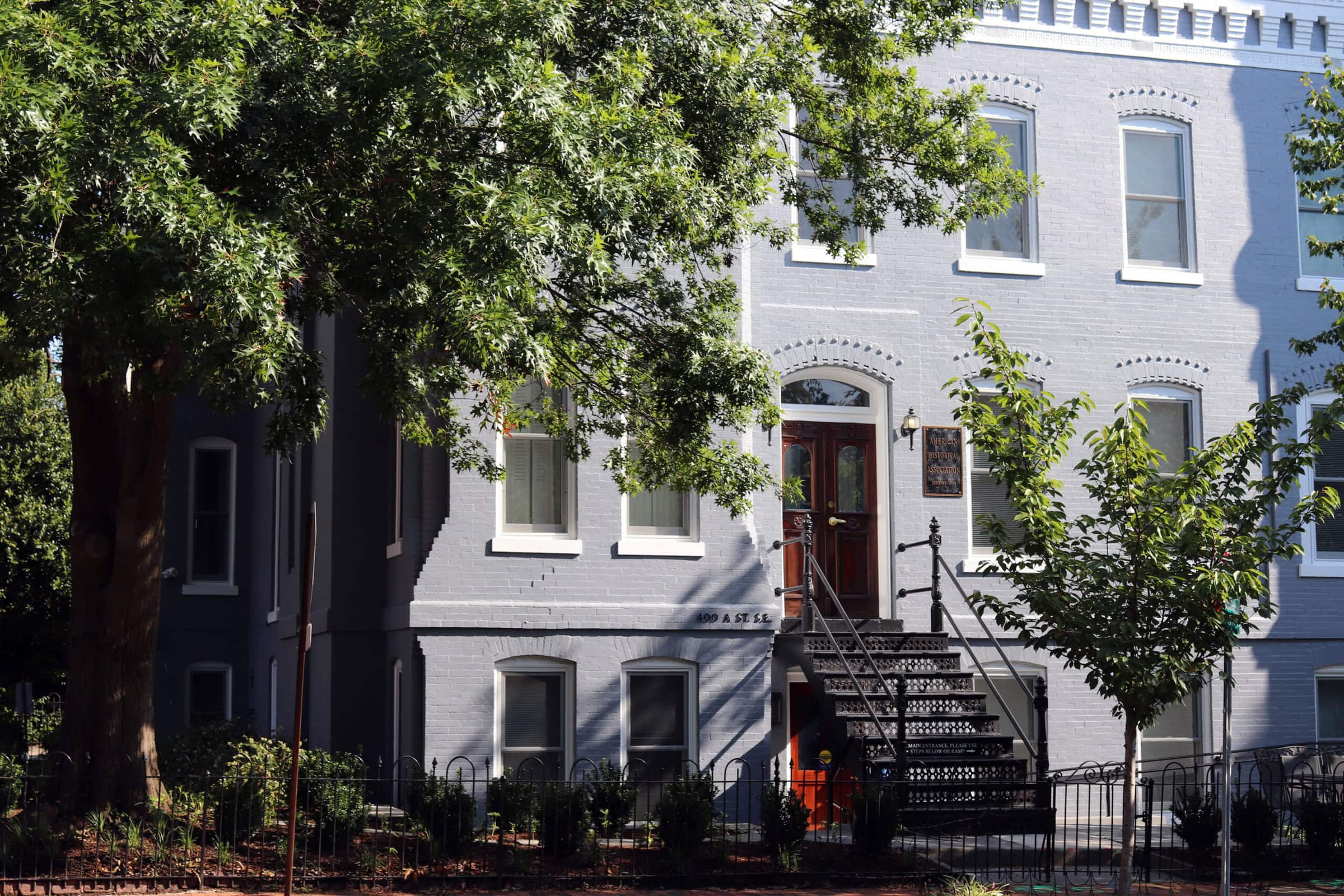Brief History of
the AHA
When the American Historical Association (AHA) was founded in 1884, history had only recently emerged as a distinct academic discipline. The first few professors in the field of history had only been appointed at major universities in the 1870s. Until then, wealthy men with the leisure time to pursue such endeavors did most of the writing of history and collection of historical manuscripts and archives.
Recognizing that a distinct field was emerging, a number of historians in the academy proposed an organization to establish high professional standards for historical training and research. In 1884, “professors, teachers, specialists, and others interested in the advancement of history in this country” were called to gather at the annual meeting of the American Social Science Association (ASSA) in Saratoga, New York. Despite the opposition of the ASSA’s president, John Eaton, the historians present voted to establish the American Historical Association as a separate organization. Herbert Baxter Adams, an associate professor in history at Johns Hopkins University, became the first secretary of the AHA and remained in that role for the next 16 years. Andrew Dickson White, a historian and president of Cornell University, was selected as the AHA’s first president.
Racist Histories and the AHA
In 2021, the AHA began an initiative "to document and reckon with the Association’s role in the dissemination and legitimation of racist historical scholarship that has had a deep and lasting influence on public culture." The AHA’s founding occurred during a decade that was rife with exclusionary practices preceding the enactment of Jim Crow laws and that saw further assault on Indigenous people’s rights through the passage of the Dawes Act of 1887. At the 1893 AHA annual meeting, Frederick Jackson Turner articulated his “frontier thesis,” published as one of the most influential articles in the history of the discipline—and one that virtually ignored the presence of African Americans in the nation’s supposedly formative process and cast Indigenous people largely as obstacles. The AHA’s origins are intertwined with this racist and exclusionary historical context.
Through the Racist Histories and the AHA initiative, the Association is researching and documenting its role in generating, disseminating, legitimating, and promoting histories that have helped contribute to the evolution and institutionalization of racism in the United States.
AHA Congressional Charter
In 1889, the Association was incorporated in the District of Columbia by an act of Congress “for the promotion of historical studies, the collection and preservation of historical manuscripts and for kindred purposes in the interest of American history and of history in America.”
AHA Historical Collections
AHA Presidential Addresses
Like the rest of the world it studies, the historical discipline has changed over time. One way of tracking these changes is in the annual addresses of the presidents of the American Historical Association. These addresses, usually broad examinations of the state of the discipline, provide a snapshot of the particular thinking and concerns of historians at specific moments in time.
Historical AHA Committee Reports
Internationalizing Student Learning Outcomes in History (2005)
Retrieving the Master's Degree from the Dustbin of History (2005)
The Status of Women in the Historical Profession (2005)
Public History, Public Historians, and the American Historical Association (2004)
Report on the Status and Hiring of Women and Minority Historians in Academia (2004)
The Education of Historians for the Twenty-first Century (2003)
Who Is Teaching in US College Classrooms? (1999)
Redefining Historical Scholarship (1993)
Committee on Women Historians’ 1980 Summary Report (1980)
Report of the AHA Committee on the Rights of Historians (1974)
The AHA Review Board: Final Report (1973)
The AHA Review Board: A Preliminary Report (1972)
Report of the AHA Committee on the Status of Women (1970)
The Education of Historians in the United States (1962)
American History in Schools and Colleges (1944)
Final Report of the Committee of Ten on Reorganization and Policy (1939)
Historical Scholarship in America: Needs and Opportunities (1932)
AHA Archives
From its inception, the Association has been committed to the collection, preservation, and dissemination of historical documents. In keeping with that tradition, the AHA staff digitizes and posts essays, reports, and other materials from the Association’s past.
AHA Activities & News

Annual Reports
Beginning in 1889, each year the American Historical Association produces an annual report that now includes reports from the editor of the American Historical Review, officers in the different divisions, and members of the different committees. Also included are the decisions of Council, minutes and resolutions from the business meeting, the association’s financial report, and more.

Year in Review
The AHA Year in Review provides an overview of the AHA's activities over the course of the year, highlighting efforts in key areas of the AHA's mission, such as leadership, advocacy, and building community. The Year in Review summarizes the activities and accomplishments of the AHA's publications, annual meeting and other conferences, public outreach, and more.
AHA Executive Directors
The day-to-day operations of the Association are led by the executive director. The position, which began with the AHA's founding in 1884, was shared by an executive secretary of the Council and executive secretary of the Association from 1900–19.
Recommended Reading
Explore the AHA’s Founding & History of the Discipline
Robert B. Townsend, History’s Babel: Scholarship, Professionalization, and the Historical Enterprise in the United States, 1880–1940 (Univ. of Chicago Press, 2013).
James M. Banner, Jr., Being a Historian: An Introduction to the Professional World of History (Cambridge Univ. Press, 2012).
Peter Novick, That Noble Dream: The “Objectivity Question” and the American Historical Profession (Cambridge Univ. Press, 1988).
Arthur S. Link, “The American Historical Association, 1884-1984: Retrospect and Prospect,” American Historical Review 90, no. 1 (February 1985): 1–17.
Thomas L. Haskell, The Emergence of Professional Social Science: The American Social Science Association and the Nineteenth-Century Crisis of Authority (Univ. of Illinois Press, 1977).
John Higham, History: Professional Scholarship in America (Johns Hopkins Univ. Press, 1965).
On the Racist Histories and the AHA Initiative
Sarah Weicksel and James Grossman, "Racist Histories and the AHA,” Perspectives on History 59, no. 2 (February 2021).
Laura Ansley, “Townhouse Notes: Long Overdue,” Perspectives on History 61, no. 1 (January 2023).
Sarah Weicksel and Mark Philip Bradley, “A Note on the AHA’s Racist Histories Initiative and Book Reviewing,” American Historical Review 127, no. 4 (December 2022): 1907.